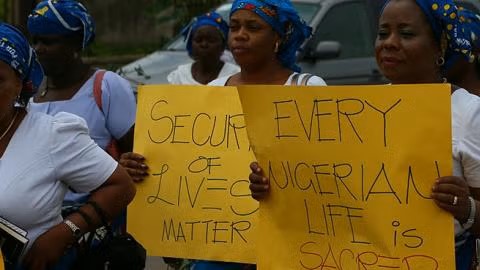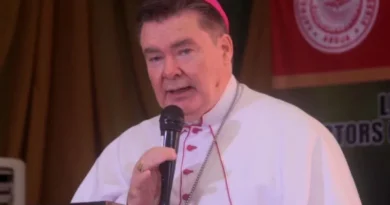Christian Genocide in Nigeria and Media Propaganda
A Nation Bleeding in Silence
Across Nigeria’s vast landscapes, its bustling cities, remote villages, and quiet farmlands, Christians are being hunted, displaced, and killed. Churches are set ablaze, pastors are beheaded, and families are wiped out in the dead of night. Yet, despite these horrifying realities, global headlines often remain muted. The world sees the flames, but not the faith behind the fire. Why? Because the narrative is carefully shaped by media propaganda; an intentional silence designed to erase the truth.
The Rising Tide of Persecution
In recent years, Nigeria has become one of the deadliest places in the world to be a Christian. Groups like Boko Haram, Fulani herdsmen militias, and ISWAP (Islamic State West Africa Province) continue to target Christian communities with precision and cruelty.
Reports by human rights organizations show that thousands of Christians are killed each year, while others are forced to flee their ancestral lands. In many rural areas of Kaduna, Benue, Plateau, and Taraba States, the once-thriving Christian populations have been nearly erased.
Yet, in most international newsrooms, these killings are downplayed as “clashes between farmers and herders.” This phrasing dilutes a genocide into a mere misunderstanding, obscuring the faith-based motive behind the violence.
The Power of Words: How Propaganda Works
Media propaganda thrives not only through lies but through strategic silence and selective framing. When Christian communities are attacked, reports often emphasize political instability or climate change as the root causes, conveniently omitting the religious dimension.
This narrative control does more than distort the truth, it shapes global perception. Western governments and international agencies, influenced by such reporting, often treat these attacks as local disputes rather than systematic religious persecution. As a result, international pressure remains minimal, and perpetrators act with impunity.
The Silence of the Global Media
Why is the suffering of Nigerian Christians not headline news? The answer lies partly in geopolitical interest. Media organizations, funded and influenced by powerful states and corporations, often avoid narratives that may portray Islamists negatively or disrupt diplomatic relations with Muslim-majority nations.
Moreover, religious bias and political correctness have made Western media hesitant to identify the religious identity of both victims and attackers. When a mosque is attacked, global headlines erupt in solidarity. But when a church is burned with worshippers inside, silence reigns. This selective empathy betrays the media’s moral compass.
Faith Under Fire: The Human Cost of a Hidden War
Behind every statistic is a name, a face, a story.
A young girl in Borno State whose father was executed for refusing to renounce Christ.
A pastor in Plateau who preaches forgiveness after losing his wife and two sons.
A community that gathers in the ruins of their church every Sunday, singing hymns amidst ashes.
These are not isolated tragedies, they are the testimonies of faith under fire. And yet, they rarely find their way into global news cycles. The world has been conditioned to see African suffering as background noise, not breaking news.
The Role of Nigerian Media: Complicity or Fear?
Within Nigeria itself, the situation is equally troubling. Many local media houses, influenced by political powers or ethnic loyalty, hesitate to report the truth boldly. Some fear government backlash; others fear reprisal attacks. Consequently, many news stories are softened or buried entirely.
Even when courageous journalists attempt to expose the truth, they face censorship, intimidation, or worse. In a nation where corruption runs deep, truth-telling becomes a dangerous act of faith.
The Church’s Response: A Call to Spiritual and Moral Action
Despite the odds, the Church in Nigeria continues to stand as a beacon of hope. Christian organizations have set up camps for displaced believers, provided food and shelter, and offered trauma counselling for survivors. Prayer vigils and intercessory movements are growing, uniting Christians across denominations.
Read Also: NC State Students Gather in Worship: ‘Glory to God’
But compassion alone is not enough. The Church must also amplify its voice globally, through Christian media, advocacy groups, and digital platforms, to expose what mainstream outlets suppress. Silence is no longer an option. Every believer has a role to play in telling the world the truth about the persecution of Nigerian Christians.
Breaking the Silence: What Must Be Done
To counter media propaganda and bring justice to persecuted believers, three actions are crucial:
Truthful Storytelling: Christian media houses must take the lead in documenting and reporting persecution stories with accuracy and courage.
International Advocacy: Faith-based organizations should engage human rights bodies and policymakers to classify these attacks as genocide, not communal conflict.
Prayer and Awareness: Churches worldwide must continually intercede for Nigeria and raise awareness within their congregations. When the global body of Christ stands united, silence breaks, and light pierces darkness.
Conclusion: Truth Will Triumph
The Christian genocide in Nigeria is not just a political issue, it is a spiritual battle for truth, justice, and humanity. Propaganda may distort, and silence may suppress, but the blood of the martyrs still cries out from the ground. The Church must rise, speak, and shine light into the shadows.
For in the end, truth will triumph over lies, and the God who sees every hidden tear will judge with righteousness. Until then, we must continue to speak, boldly, faithfully, and without fear—for those whose voices the world refuses to hear.
Content Credit | Olaoluwa Ayomide
Image Credit | hudson.org




